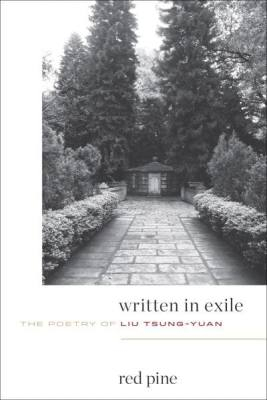Written in Exile: the poetry of Liu Tsung-yuan
Written in Exile: the poetry of Liu Tsung-yuan
$33.95
In stock, will ship in 2 – 3 business days
ISBN / SKU
9781556595622
Format
Paperback
Pages
256
Dimensions
228 x 152
Description
After a failed push for political reform, the greatest prose writer of the T'ang era, Liu Tsung-yuan, was exiled to the southern reaches of China. Thousands of miles from home and freed from the strictures of court bureaucracy, he turned his gaze inward and chronicled his estrangement in poems. Liu's fame as a prose writer, however, overshadowed his accomplishment as a poet. Three hundred years after Liu died, the poet Su Tung-p'o ranked him as one of the greatest poets of the T'ang, along with Tu Fu, Li Pai, and Wei Ying-wu. And yet Liu is unknown in the West, with fewer than a dozen poems published in English translation. The renowned translator Red Pine discovered Liu's poetry during his travels throughout China and was compelled to translate 140 of the 146 poems attributed to Liu. As Red Pine writes, "I was captivated by the man and by how he came to write what he did." Appended with thoroughly researched notes, an in-depth introduction, and the Chinese originals, Written in Exile presents the long-overdue introduction of a legendary T'ang poet.
PRAISE
"This bilingual collection provides readers with generous, thoughtful contextualizing material and a memorable introduction to Liu's vivid writing."
—Publishers Weekly
"Masterful translations… Written in Exile: The Poetry of Liu Tsung-yuan is a collection to be studied in the classroom or enjoyed by the fireside as an impressively executed curation of literature in translation."
—Reading in Translation
"This book is a precious thing that repays study…"
—RHINO Poetry
ABOUT THE AUTHOR
After a failed push for political reform, the T'ang era's greatest prose writer, Liu Tsung-yuan, was exiled to the southern reaches of China. Thousands of miles from home and freed from the strictures of court bureaucracy, he turned his gaze inward and chronicled his estrangement in poems. Liu's fame as a prose writer, however, overshadowed his accomplishment as a poet. Three hundred years after Liu died, the poet Su Tung-p'o ranked him as one of the greatest poets of the T'ang, along with Tu Fu, Li Pai, and Wei Ying-wu.
Bill Porter assumes the pen name Red Pine for his translation work. He was born in Los Angeles in 1943, grew up in the Idaho Panhandle, served a tour of duty in the US Army, graduated from the University of California with a degree in anthropology, and attended graduate school at Columbia University. Uninspired by the prospect of an academic career, he dropped out of Columbia and moved to a Buddhist monastery in Taiwan. After four years with the monks and nuns, he struck out on his own and eventually found work at English-language radio stations in Taiwan and Hong Kong, where he interviewed local dignitaries and produced more than a thousand programs about his travels in China. His translations have been honored with a number of awards, including two NEA translation fellowships, a PEN Translation Prize, and the inaugural Asian Literature Award of the American Literary Translators Association. He was awarded a Guggenheim Fellowship to support work on a book based on a pilgrimage to the graves and homes of China's greatest poets of the past, which was published under the title Finding Them Gone in January of 2016. More recently, Porter received the 2018 Thornton Wilder Prize for Translation bestowed by the American Academy of Arts and Letters. He lives in Port Townsend, Washington.
PRAISE
"This bilingual collection provides readers with generous, thoughtful contextualizing material and a memorable introduction to Liu's vivid writing."
—Publishers Weekly
"Masterful translations… Written in Exile: The Poetry of Liu Tsung-yuan is a collection to be studied in the classroom or enjoyed by the fireside as an impressively executed curation of literature in translation."
—Reading in Translation
"This book is a precious thing that repays study…"
—RHINO Poetry
ABOUT THE AUTHOR
After a failed push for political reform, the T'ang era's greatest prose writer, Liu Tsung-yuan, was exiled to the southern reaches of China. Thousands of miles from home and freed from the strictures of court bureaucracy, he turned his gaze inward and chronicled his estrangement in poems. Liu's fame as a prose writer, however, overshadowed his accomplishment as a poet. Three hundred years after Liu died, the poet Su Tung-p'o ranked him as one of the greatest poets of the T'ang, along with Tu Fu, Li Pai, and Wei Ying-wu.
Bill Porter assumes the pen name Red Pine for his translation work. He was born in Los Angeles in 1943, grew up in the Idaho Panhandle, served a tour of duty in the US Army, graduated from the University of California with a degree in anthropology, and attended graduate school at Columbia University. Uninspired by the prospect of an academic career, he dropped out of Columbia and moved to a Buddhist monastery in Taiwan. After four years with the monks and nuns, he struck out on his own and eventually found work at English-language radio stations in Taiwan and Hong Kong, where he interviewed local dignitaries and produced more than a thousand programs about his travels in China. His translations have been honored with a number of awards, including two NEA translation fellowships, a PEN Translation Prize, and the inaugural Asian Literature Award of the American Literary Translators Association. He was awarded a Guggenheim Fellowship to support work on a book based on a pilgrimage to the graves and homes of China's greatest poets of the past, which was published under the title Finding Them Gone in January of 2016. More recently, Porter received the 2018 Thornton Wilder Prize for Translation bestowed by the American Academy of Arts and Letters. He lives in Port Townsend, Washington.
Reviews

